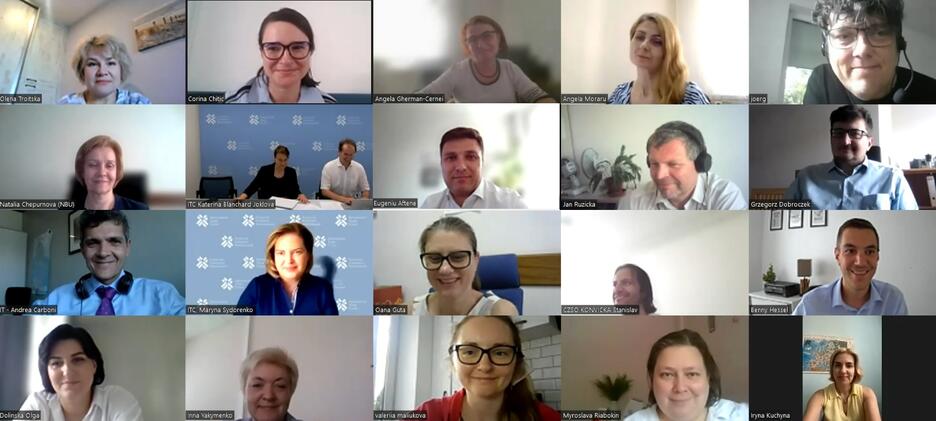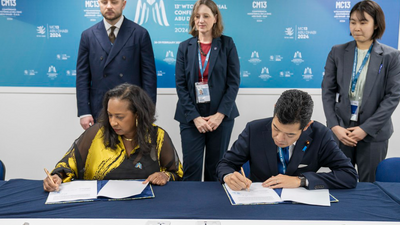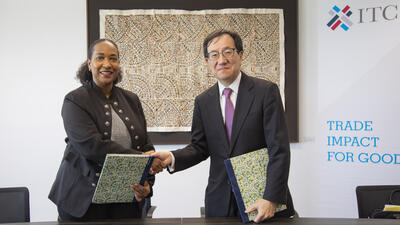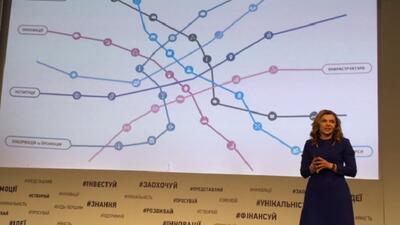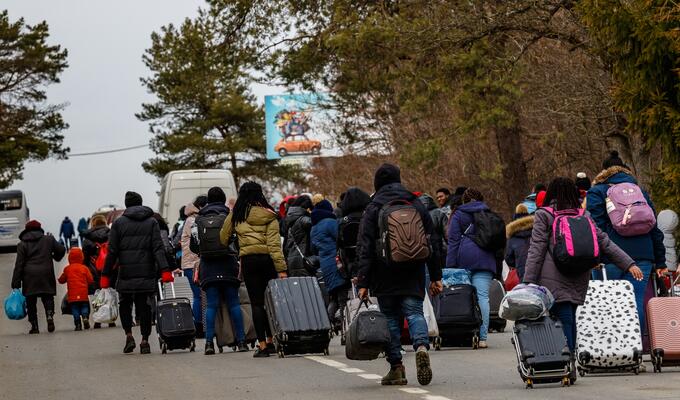

Tracking expenditures by Ukrainian refugees for travel statistics
More than six million Ukrainians have fled the war. Countries have taken different approaches on how to count the economic effects of this migration. For data collectors, the question is how to decide whether refugees keep their Ukrainian residency status during the first year of their stay abroad. That question has a huge effect on how to measure the effects of the war on trade in travel services.
The National Bank of Ukraine (NBU) is tasked with compiling this data, but struggles even to find sources to pull statistics from.
‘Methodology and data exchanges with principal trade partners are extremely important to us, due to data gaps we currently face,’ said Nataliia Chepurnova, head of the External Sector Statistics Office at NBU.
ITC has steadfastly supported Ukrainian data compilers to enhance the balance of payments statistics. Under the Eastern Partnership Trade Helpdesk Project, one of the primary goals of ITC is to improve the data for the travel sector. This was identified as a priority area in mid-2021, and it’s only become more relevant now.
Are refugees travellers?
For Ukraine to correctly compile data on travel spending, they have to determine refugees’ residency status. This significantly affects the balance of payments statistics, which cover transactions between residents and non-residents.
If a refugee still has Ukrainian residency, they are considered travellers whose spending counts as imports of travel services.
Once they become residents of their host country, their expenditures abroad are not captured. International recommendations only offer clear guidance for stays longer than one year. For shorter stays, they rely on intentions of refugees – whether they intend to stay longer than one year.
To navigate this uncertainty, the NBU decided to record refugees as non-residents during their first year abroad. ITC then surveyed compilers in countries that received many refugees. The survey asked how each country collected this data, and how they determined residency status.
The outcomes were discussed during the Virtual Workshop on Compilation of Travel Statistics with Focus on Ukraine, hosted by ITC on 27 June.
Poland, the Czech Republic and Moldova differentiated between resident and non-resident refugees. They included expenditures of non-residents in exports of travel services to Ukraine.
But Germany, Romania, Slovakia, and Hungary consider refugees as residents from the moment of their registration.
‘We have observed an increase in reported payments with Ukrainian credit and debit cards in 2022, but we asked ourselves the question whether this is travel,’ said Jörg Feuerhake, Senior Statistician from Deutsche Bundesbank. ‘As most Ukrainians entering Germany registered with German authorities, we assume that they intended to stay longer than one year, and consider them as residents.’ As a result, Ukraine did not constitute a major trade partner of Germany for trade in travel services in 2022.
Poland has experienced a huge influx of refugees, peaking at 100,000 persons a day.
‘Many refugees do not identify themselves as Polish residents, and we therefore use surveys to estimate shares of refugees who wish to leave Poland withing the next 12 months,’ said Grzegorz Dobroczek, Acting Deputy Director of Department of Statistics at Narodowy Bank Polski.
In May 2022, nearly 63% of refugees intended to leave Poland within the coming months. This number decreased to 43% in November 2022. The NBP conducts corresponding estimations for exports of travel to Ukraine.
How much do refugees spend?
Estimating expenditures of Ukrainians abroad remains a complex task.
‘Reports on payments by Ukrainian credit and debit cards abroad represent currently the only data sources available,’ said Chepurnova. However, NBU lacks access to payment classifications, hindering precise categorization.
The issue takes greater importance due to new EU requirements on reporting of transactions abroad. Banca d’Italia and Deutsche Bundesbank coordinate the activities of the Travel Workshop, an international working group for compilers of travel statistics.
‘Merchant Category Codes were created by credit card companies, and we must match them with nomenclature used by trade in service data compilers,’ said Andrea Carboni, from Banca d’Italia. ‘This is not an easy job, as we often need to distinguish between face-to-face transactions and remote transactions. One MCC code may correspond to more types of services, depending on mode of supply.’
Following the meeting, NBU decided to join the Travel Workshop group. ITC will continue facilitating the dialogue between Ukrainian compilers and their counterparts from the EU and Eastern Partnership countries.
Experts attended from
National Bank of Ukraine
State Statistics Service of Ukraine
State Agency for Tourism Development of Ukraine
Ministry of Infrastructure
Deutsche Bundesbank
Narodowy Bank Polski
National Bank of Moldova
Czech Statistical Office
Banca d'Italia
National Bank of Romania
About the project
This workshop was organized as part of the Eastern Partnership Trade Helpdesk Project, funded by the EU. The project aims to centralize trade intelligence and information on market requirements within the region and with the EU through the EaP Trade Helpdesk platform. Under Component 5 of the project, focused on Trade in Services Data Management, ITC provides capacity-building and analytical assistance to national governments, aligning data collection and processing with international standards.




